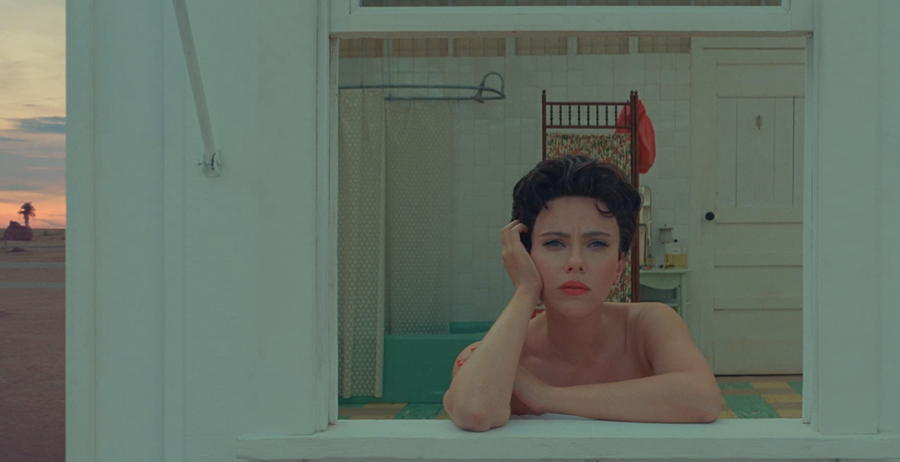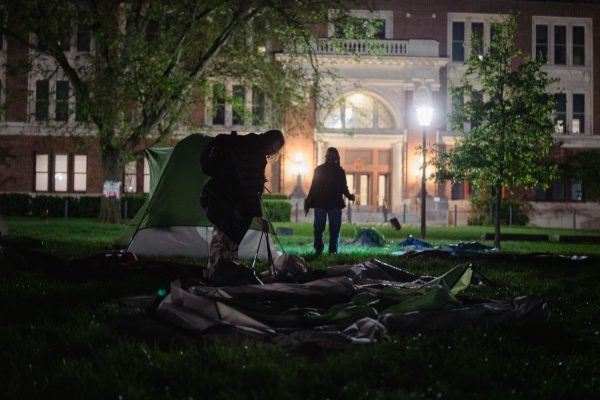Column | ‘Asteroid City’ bites off more than it can chew
June 30, 2023
Pretension is an affliction common in writers across film, books, television and journalism with symptoms both obvious and curable.
If you find someone trustworthy and unrelenting to chip away at the stone block of your work, the end result could be profound and insightful. If not, it could remain shrouded in pseudo-intellect.
Despite a tempting setup for what its characters believe to be the tale of the century, Wes Anderson’s new film “Asteroid City” gets caught up in its words, unable to wholly express its thoughts on the imperfect canvas of language. It seems as though Anderson was left unedited.
Across his films, Wes Anderson has managed to mold a universe to portray the ever-moving gears of his imagination. Although he’s previously been able to create an entire visual language – including a palette, symmetry, nostalgia and illusion– to articulate his daydreams, he may be overburdened by his own creativity.
The film is a lot. Much like the chugging freight train that clangs through the desert into the titular town in the movie’s first scenes, it is overpacked with contents, doesn’t slow down and passes by without leaving much effect.
Get The Daily Illini in your inbox!
“Asteroid City” may leave you overwhelmed, as if you’re listening to an exasperated friend.
This film’s viewing experience feels like you’re watching television but changing the channel once you start getting attached. The viewer may pose the question: “Is this what the inside of Anderson’s imagination is like?”
Anderson has roped in something of a “who’s who” cast for the project, contributing to its already intense box office appeal.
This movie is at least tangentially about aliens, but it is strikingly multifaceted. “Asteroid City” explores love and grief, pens a love-letter to midcentury television and pays tribute to the theater.
It is a story within a story — and then some. In the main plotline, a town reckons with the brief arrival of an alien at a stargazing event — which is all in reality a television play masterminded by an eccentric playwright. The lives of the actors who are playing the characters in the fictional “Asteroid City” play are then plumbed — albeit tediously — for narrative content.
Splitscreen shots — an annoying habit Wes Anderson seems to have recently picked up — distract the eye and leave the viewer guessing about what visual gag they could have just missed.
Just as you’re grasping the charming tale of a photojournalist and his quirky family getting their bearings in a desert town, you’re forced to listen to Edward Norton’s best William Faulkner impression in black and white.
There’s something like 10 A-list actors in this movie — including Margot Robbie, who is completely wasted on some bit part. Still, 12 actors frankly couldn’t make up for the absence of Owen Wilson, who’d be right at home in a movie about the American Southwest.
Jason Schwartzman and Scarlett Johanson give serviceable and controlled performances as characters modeled after figures of midcentury Americana.
Schwartzman’s “Steenbeck” character bears a resemblance in both name and appearance to a mix of two famous Men’s men: Ernest Hemingway and John Steinbeck. Johansson’s beleaguered movie star evokes Audrey Hepburn.
There are a lot of characters in “Asteroid City” that seem to be filling archetypes rather than growing on their own. It’s interesting for a while, like in the case of a charming cowboy character in a Canadian tuxedo who drops some salty wisdom with his band of hobos — but after a bit it can lend the feeling that you’ve seen this movie before.
The film’s approach to character development edges a little too far over the line between allusion and cliche, a rail Wes Anderson has walked better in the past.
Which is a shame, because Anderson’s distinct style has created a cliche — and creating a cliche is probably the most original thing you can do. In “The French Dispatch,” Anderson leans into his cliche and expands upon it, a feat he does not replicate in “Asteroid City.”
Bright spots come about in the small interactions. Tom Hanks showcases his mastery for the mundane as a curmudgeonly grandfather taking care of his grandkids who have just been belatedly told of their mother’s death. Steve Carrell brings a welcome relief as an overbearing hotel attendant who putters about with martinis, reflective visor and all.
All of this isn’t to say that with his better movies Wes Anderson took fewer creative risks — the opposite, actually.
In both “The French Dispatch” and “The Grand Budapest Hotel,” Anderson maintained his stylistic integrity and executed Russian doll narratives with a deft and articulate approach.
Past films employed silence, rumination and sincere emotion between characters as citrus to cut through narrative fat. “Asteroid City” lacked this nuance and sensitivity.
For a film intended to focus on aliens, questions about the implications of extraterrestrial contact are mostly left to wide-eyed school children and a couple of navel-gazing characters.
The interesting questions Anderson could have asked are left untouched in favor of the big, painfully obvious ones.
“What if there’s a meaning to life?” a character asks, before he — and Anderson, it seems — mostly leave it at that.







